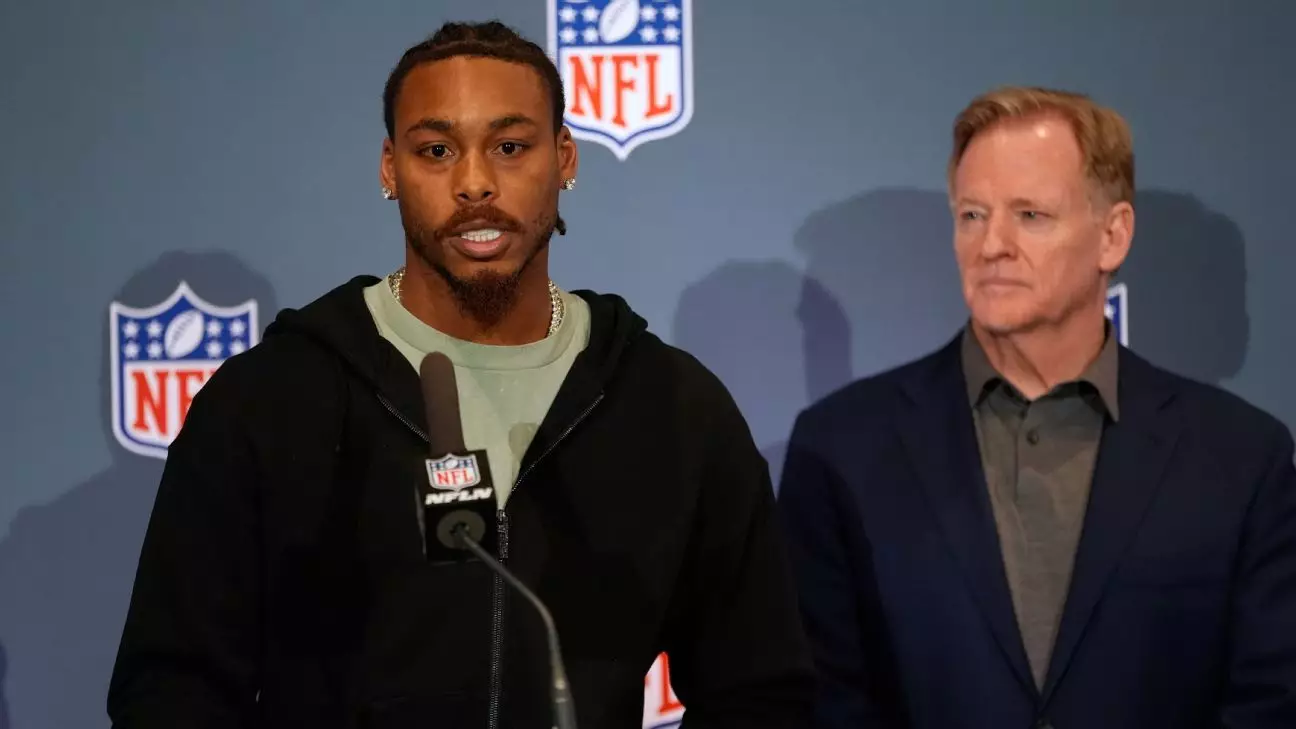In a groundbreaking decision, the NFL has taken a significant stride towards recognizing the global appeal of football by allowing professional players to compete in flag football at the 2028 Los Angeles Olympics. The unanimous approval from the league’s 32 owners during the recent spring meetings represents not just a shift in policy, but a monumental transformation in how American football is perceived on the world stage. Justin Jefferson, the Minnesota Vikings’ star wide receiver, joyfully celebrated this moment, illustrating the excitement that many feel about the potential for NFL athletes to showcase their skills internationally.
As Jefferson aptly put it, the dream of winning an Olympic gold medal is something rooted deeply in childhood aspirations. For many, the Olympics symbolize the pinnacle of athletic achievement, and the inclusion of flag football offers a new dimension where millions of fans could potentially witness their favorite NFL players competing in a different format of the game. This new development signals a progressive step toward the internationalization of American football, a sport that has historically struggled to find its footing beyond the United States.
Flag Football: A New Arena for Competition
The decision to include flag football in the Olympic competition is not merely a logistical formality; it’s a distinct opportunity to explore the essence of teamwork and athleticism in a more accessible format. Flag football requires a unique skill set, one that diverges from traditional tackle football yet emphasizes agility, speed, and teamwork. NFL players like Jefferson and Vikings linebacker Brian Asamoah II, who are both serving as Global Flag Ambassadors, are eager to embrace this change.
Jefferson’s recent experience at the Pro Bowl Games infuses some excitement into this new Olympic venture. His candid reflections on the thrill of engaging in a less conventional style of play suggest that athletes find joy in variety, a reason why flag football might become an appealing arena for professional players. As he expressed, the spirit of play vastly differs when athletes can engage in a relaxed atmosphere that harkens back to childhood—an environment ripe for camaraderie and enjoyment.
Future Challenges and Integration
Implementing this inclusion, however, isn’t without its hurdles. While the proposal has passed, the NFL faces critical negotiations with the NFL Players Association and Olympic officials to iron out myriad details surrounding player participation, insurance, and representation constraints. The prospect of players competing for other nations due to international heritage adds another layer of complexity to the situation, highlighting the demand for a thoughtful and inclusive process.
Timing presents another logistical dilemma. NFL players must navigate the dual demands of training for their respective teams and preparing for Olympic competition. The NFL executives have expressed commitment to creating a framework that allows athletes to participate in both formats without conflict, but ensuring this synchronization is essential. As Peter O’Reilly, NFL executive, notes, finding the right balance between the Olympic schedule and the NFL calendar will be pivotal for players’ training and well-being.
Expanding the Game’s Reach
The excitement surrounding flag football’s Olympic inclusion is rooted in a desire to expand the game beyond its traditional borders. For years, football has been synonymous with American culture, often lacking a global presence compared to other sports like soccer or basketball. The excitement expressed by NFL executives like Troy Vincent, who sees this as a chance for athletes to shine, reinforces the sentiment that sports should inspire competition, foster skills, and bring joy.
As the NFL aims to galvanize a younger generation and unite athletes from diverse backgrounds, opportunities in flag football may serve as a pathway toward building bridges with international audiences. The infusion of talents from different countries could reshape the face of the sport, showcasing a new breed of athlete that isn’t just confined to the constraints of traditional football.
A Call for Respect and Recognition
Yet, as this new chapter unfolds, there is an underlying consideration that shouldn’t be overlooked: the pool of talented flag football athletes who have been honing their craft outside the professional NFL realm. The respect owed to these players is paramount; they have specialized in a game that, while derived from traditional football, has developed its own nuances and demands. The integration of NFL stars into the flag football scene must be approached with sensitivity to the existing community of flag football players who have tirelessly trained for such opportunities.
The selection process for the Olympic team will undoubtedly be a talking point moving forward. How the NFL balances the elevating of its stars while ensuring fairness and recognition for dedicated flag football athletes will define this initiative’s success. Regardless of the challenges, the union of NFL talent in the Olympics heralds a thrilling prospect for both players and fans—one that not only serves to entertain but uniquely represents the growing embrace of football as a truly global sport.

